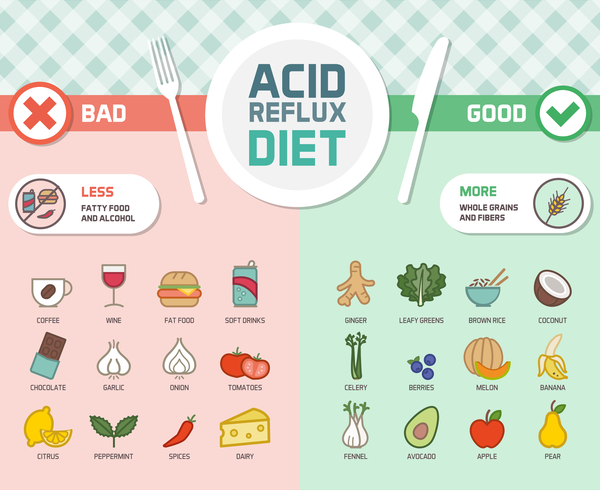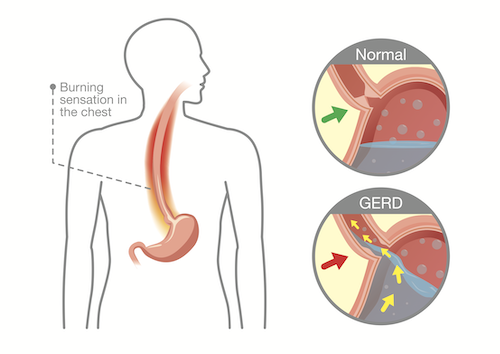Acid reflux, also known as heartburn, is a common condition during which some of the stomach’s acidic contents travel back into the esophagus, causing uncomfortable symptoms. Although sometimes unavoidable, various factors increase your chances of symptoms.
How common is acid reflux? According to the American College of Gastroenterology, about 60 million Americans experience heartburn at least once a month.
Almost all of us have occasionally overeaten or consumed too much alcohol or coffee, causing that feeling of mild tightness in the chest. But do you know why this happens? In short, heartburn is typically a symptom of acid reflux.
However, while occasional bouts of acid reflux are relatively common, frequent incidents can be a symptom of a more severe condition: GERD. Keep reading for acid reflux treatments, causes, and the best lifestyle adjustments.
What Causes Acid Reflux?
Your stomach contains acid to break down the foods you eat. Without it, you cannot digest it properly. However, stomach acid becomes problematic if it reaches the muscular tube that connects your stomach to your throat, known as the esophagus.
To keep stomach acid and food away from the esophagus, a circular ring of muscle called the lower esophageal sphincter (LES) closes to prevent acid from traveling up. In addition, the esophageal sphincter relaxes and opens to allow chewed food to reach the stomach.
However, when the LES relaxes when it shouldn’t, stomach acid can reach the esophagus and can cause acid reflux.
WHAT ARE THE SYMPTOMS OF REFLUX IN ADULTS?
The main symptoms of acid reflux are heartburn and an acidic taste in the back of the throat. Typically, heartburn feels like discomfort or a slight “burning” sensation in the chest and will sometimes start in your stomach and travel upwards. Please be aware, however, that not all chest pain stems from acid reflux and that sudden bouts of chest pain can be signs of a cardiac issue, like a heart attack.
- Heartburn: A burning sensation in the chest that occurs after eating or drinking
- Chest pain: A feeling of pressure or pain in the chest
- Sour taste in the mouth: A metallic or sour taste that occurs when stomach acids come up into the mouth
- Regurgitation: The feeling of stomach acid or food coming back up into the throat
- Hoarseness: A change in the voice caused by stomach acid irritating the voice box
- Bloating: Frequent belching, gas, and bloating can happen as a result of frequent swallowing
- Nausea: An uneasiness or discomfort in the stomach from other acid reflux symptoms
WHAT ARE THE WARNING SIGNS OF REFLUX?
As mentioned earlier, a bitter/sour taste in the back of the throat and some chest pain are the most common signs that you might have a case of acid reflux. It would be best to monitor how often these bouts happen. Frequently occurring acid reflux and severe heartburn can signify gastroesophageal reflux disease (GERD).
How To Treat Acid Reflux
The best way to treat acid reflux is making essential diet and lifestyle changes. In mild cases, the simple steps outlined below may be all you’ll need to ease discomfort.
As you make lifestyle and diet changes, keep a food journal to keep track of what triggers or helps your acid reflux. Also, record the time of day you eat, activities near the time you eat, and your stress levels.
1. ACID REFLUX FOODS TO AVOID
- Avoid fatty or spicy foods
- Eat fewer acidic foods, like foods with citrus and tomatoes. These can make your symptoms worse
- Limit drinks that are fizzy, caffeinated, or contain alcohol since these all increase acid reflux
- Limit foods and beverages with chocolate, peppermint, or spearmint, as these can make acid reflux worse in some people
2. WATCH WHEN YOU EAT
- Don’t lie down for at least three hours after eating a meal
- Don’t snack before going to bed or taking a nap
3. TILT YOUR UPPER BODY
Raise your upper body by a minimum of 4 to 6 inches (10 to 15 cm) when lying down. This position helps limit reflux. Put blocks or bed risers under the head of your bed frame or a wedge under your mattress to raise it.
4. OTHER CHANGES
- Lose weight, if you need to
- Don’t eat large meals
- Don’t exercise near bedtime
- Don’t wear tight-fitting clothes or tight belts
- Limit your use of aspirin, ibuprofen, blood pressure medications, and muscle relaxers
- Stop smoking; if you smoke
Immediate Acid Reflux Treatment at Home
Mild cases of acid reflux can be treated with simple home remedies and lifestyle adjustments. Likely, though, you may also want to know what helps acid reflux immediately.
The most common home acid reflux treatment is to take an over-the-counter medication called an antacid. However, you may not always have an antacid when needed.
ACID REFLUX REMEDIES
For an at-home and natural treatment for acid reflux, you can try baking soda. Drink ½ teaspoon of baking soda dissolved in a four-ounce glass of water.
Baking soda neutralizes acid since it has an alkaline PH. Therefore, baking soda is helpful to drink for immediate relief from occasional heartburn.
If your acid reflux gives you a sore throat or cough, try drinking Aloe juice. Aloe commonly soothes burns and irritated skin and works for internal irritations. If you have regular heartburn, drink ½ cup of aloe juice before a meal. Only drink pure, unprocessed aloe vera juice with no added sugars or juices.
BEST SLEEPING POSITION FOR ACID REFLUX
If you find yourself suffering from acid reflux, you should consider your daily habits. Even the way you sleep can inadvertently cause bouts of reflux symptoms. According to multiple research studies, sleeping on your left side, with your head elevated, helps reduce nighttime episodes of acid reflux.
Sleeping on your left side may help because your esophagus connects to your stomach on the right side. So, when you lay on your left side, your lower esophageal sphincter is further away from your stomach acids, making it less likely that stomach acids will enter the esophagus.
How Acid Reflux Affects Your Throat
Do you have to clear your throat or cough often? Are you hoarse? Do you have trouble swallowing or heartburn, or pain in your throat?
You may have acid reflux if you have these or other throat symptoms. Acid reflux occurs when stomach acid flows back up and irritates your throat.
WHY YOU HAVE THROAT SYMPTOMS
Muscles (esophageal sphincters) at both ends of the tube carry food to your stomach (the esophagus). These muscles relax to let food pass, then tighten to keep stomach acid down.
When the lower esophageal sphincter (LES) doesn’t tighten enough, acid can flow back (reflux) from your stomach into your esophagus. This reflux may cause heartburn.
In some cases, the upper esophageal sphincter (UES) also doesn’t work well, which allows acid to travel higher and enter your throat (pharynx). In many cases, this causes throat symptoms. The best acid reflux sore throat treatment is aloe vera juice and throat lozenges.
COMMON THROAT SYMPTOMS
- The need to clear your throat often
- Feeling like you’re choking
- Long-term (chronic) cough
- Hoarseness
- Trouble swallowing
- Feel like you have a lump in your throat
- Sour or acid taste
- Sore throat that keeps coming back
Foods That Cause Acid Reflux

According to Johns Hopkins Medicine, the biggest culprits for acid reflux are foods that delay the digestive process and cause the esophageal sphincter to relax. Foods to avoid acid reflux include anything salty, fatty, or spicy.
AVOID EATING THESE FOODS TO REMEDY ACID REFLUX
- Alcohol
- Caffeinated beverages
- Carbonated beverages
- Cheese
- Chocolate
- Fatty meats such as bacon and sausage
- Fried food
- Garlic
- Mint
- Onions
- Pizza
- Potato chips
- Processed snacks
- Salt, pepper, and chili powder
WHAT FOOD HELPS ACID REFLUX GO AWAY?
Although no foods can instantly make acid reflux “go away,” most sources agree on a broad set of foods that help prevent heartburn. Generally speaking, foods high in fiber are considered a solid option for those trying to avoid acid reflux symptoms.
Think oatmeal and whole grains rather than bread and cookies. As for vegetables and fruits, try to select less acidic options. Some good choices would be nuts, watermelons, and ripe bananas.
You’ll want to eat ripe bananas over unripe ones because ripe bananas contain more alkaline, which counteracts stomach acids. Conversely, the high starch content of unripe bananas can cause acid reflux.
Best FOODS FOR ACID REFLUX TREATMENT
- Melons
- Bananas (ripe)
- Nuts
- Fennel
- Ginger
- Cauliflower
- Brown Rice
- Oatmeal
- Avocados
HOW ELSE CAN I RELIEVE ACID REFLUX?
The best long-term acid reflux treatment is addressing your diet. As mentioned earlier, avoiding fatty foods, salt, and carbonated beverages can significantly help reduce reflux. Aside from this, over-the-counter medication such as Tums or Pepto-Bismol can help relieve mild heartburn as well. At-home remedies include drinking a baking soda solution and Aloe vera juice.
Some experts also say that physical movements or changes can ease acid reflux. For example, elevating your feet or avoiding food before bedtime are often touted as easy ways to prevent digestive issues.
DOES WATER REMEDY ACID REFLUX?
You should know how to calm acid reflux while it is happening. Water can dilute the contents of your stomach and wash down anything stuck in your esophagus. So if you are mid-bout of acid reflux, water might be worth a try. However, gulping down large quantities of water can also disturb your esophagus and cause acid reflux.
The best overall strategy is taking small sips with your meal and eating slowly. Remember that swallowing food without chewing can also increase your chances of symptoms.
DO TUMS HELP DIGESTIVE REFLUX?
As mentioned earlier, Tums can help ease mild heartburn and acidity. Since most people only occasionally suffer from acid reflux, Tums are a common and effective medication for mild acid reflux treatment. Tums antacid may even be the fastest way to cure acid reflux at home.
However, it is best not to rely on over-the-counter medication for long periods. Some people find that Tums help reduce their symptoms, while others find that they do not help. If your symptoms are severe enough that this issue persists and interferes with your life regularly, it is best to consult your primary care physician.
DOES MILK HELP REFLUX SYMPTOMS?
There is some evidence that milk can help relieve acid reflux symptoms, like a burning throat, fast. Studies show that the calcium in milk may help to neutralize stomach acids. Low-fat milk and yogurts may stabilize your stomach acidity and provide momentary relief from acid reflux. However, remember that any significant quantities of fat can cause further acidity, so it’s best to stay away from full-fat dairy.
What can I drink to neutralize acid reflux?
To neutralize an acid, you need a basic or an alkaline substance. For example, baking soda is a common household pantry item and is very alkaline. You can drink half a teaspoon of baking soda dissolved in 4 ounces of water to neutralize acid reflux.
Aloe vera juice also relieves throat irritation caused by acid reflux.
ACID REFLUX SYMPTOM RELIEF
Soothing your throat may be your top priority after acid reflux. First, sip warm beverages, like herbal tea with raw, unfiltered honey, to help calm symptoms. Other beverages to drink for acid reflux include cold milk and aloe vera juice.
Then, to manage pain, gargle with salt water and eat something cold, like a popsicle. Throat lozenges for sore throats can also be soothing to the throat after acid reflux.
WHAT CAN STOP ACID REFLUX IMMEDIATELY?
Unfortunately, there’s no magic pill to stop acid reflux completely. Over-the-counter antacids provide fast acid reflux relief, but it’s always best to prevent reflux in the first place.
Natural remedies without medication primarily consist of diet and eating habit changes. First, eat slowly, don’t swallow huge chunks of food or water all at once, and stay away from salty/fatty foods. Also, stay sitting or standing for a few hours after eating, and avoid vigorous exercise until a few hours after a meal.
Remember that later stages of GERD can seriously harm your health and that over-the-counter medications are not a substitute for medical intervention.
ACID REFLUX VS. GERD
Acid reflux is a common short-term condition during which some stomach acids travel back into the esophagus. It’s crucial to differentiate GERD from acid reflux, as GERD is a chronic and progressive disease during which acid reflux regularly occurs.
GERD is a more severe form of reflux that can cause more serious problems, such as inflammation and scarring of the esophagus. It can also lead to pneumonia if you inhale stomach acids into your lungs. You may have GERD if you experience acid reflux or heartburn more than twice a week or if acid reflux causes inflammation in the esophagus. If you think you may have GERD, schedule an appointment with a knowledgeable doctor near you.
There are four commonly recognized types of GERD:
- Mild GERD
- Moderate GERD
- Severe GERD
- Precancerous lesions or esophageal cancer

CHRONIC GERD AND ACID REFLUX TREATMENT
A more potent treatment may be necessary if lifestyle and diet changes don’t stop acid reflux from recurring. See a specialist for chronic acid reflux. They may prescribe you a stronger medication or recommend surgery.
BEST TREATMENTS FOR ACID REFLUX
Medications may be the most potent way to relieve acid reflux and GERD. However, not all over-the-counter treatments for acid reflux act the same way. Some OTC medications are designed for temporary relief, while others address long-term problems.
Here’s what to take for acid reflux relief:
- Antacids: neutralize stomach acid and provide fast relief; can have side effects, like diarrhea and kidney problems; do not heal an inflamed esophagus
- Histamine (H-2) blockers: reduce acid production; provide more extended relief for up to 12 hours
- Proton pump inhibitors: heal the esophagus and block acid production; stronger than H-2 blockers and allow time for esophageal tissue to heal
- Foaming agents: coat the stomach and form a protective layer to prevent acid from reaching the esophagus
- Prokinetics: blocks dopamine and stimulates some muscles in your digestive system to empty the stomach faster
For chronic acid reflux and GERD treatments, you may need a prescription medication from a GERD specialist.
Severe acid reflux treatment:
- Prescription-strength proton pump inhibitors: work the same way as OTC proton pump inhibitors, but they are much stronger at a higher dose
- Prescription-strength H-2 blockers: also identical to OTC H-2 blockers but require a doctor’s prescription since they have a higher dose than OTC
Available GERD Treatments in Nashville
At The Surgical Clinic, we provide patients across Nashville and Middle Tennessee with access to the latest and most effective treatments for GERD. If lifestyle changes and medications are no longer enough, our surgeons offer advanced options tailored to your needs:
- LINX® Reflux Management System – A minimally invasive procedure that uses a small ring of magnetic beads to support the lower esophageal sphincter, preventing acid from flowing back into the esophagus while allowing normal swallowing.
- Nissen Fundoplication – A proven surgical option that reinforces the valve between the stomach and esophagus by wrapping the upper part of the stomach around the lower esophagus to stop reflux.
- TIF (Transoral Incisionless Fundoplication) – An endoscopic, incisionless procedure that rebuilds the natural barrier between the stomach and esophagus, offering relief without external scars.
Our surgeons perform these procedures at several convenient Nashville-area locations, giving you access to expert GERD treatment in Nashville close to home. To explore which option may be right for you, visit our GERD Treatment Center or schedule a consultation with one of our specialists.
While surgical treatments are highly effective, we also recommend exploring non-surgical GERD management strategies. Visit our guide for What Foods to Avoid with GERD Symptoms and Acid Reflux to learn about lifestyle changes that can help control symptoms.
GERD RELIEF AT THE SURGICAL CLINIC
Is there an acid reflux cure? If lifestyle changes and medications don’t solve acid reflux and GERD issues, then specialized surgeons can perform a procedure. Your doctor will discuss the best surgical options for your needs and answer any questions.
So if you’re ready to cure GERD permanently, we’d be more than happy to do a consultation and discuss options.
To learn more about GERD and acid reflux, visit our virtual GERD Center here on our website.
Don’t struggle with acid reflux or GERD on your own. Instead, contact us for a consultation and get the relief you need. The Surgical Clinic has locations in Greater Nashville, including Mt Juliet, Downtown, Franklin, Cool Springs, Hermitage, Columbia, Gallatin, Murfreesboro, and Smyrna.
Frequently Asked Questions
Where can I find GERD treatment in Nashville?
What GERD treatments are available in Nashville besides medication?
Beyond medications, our surgeons perform surgical options such as the LINX® Reflux Management System, Nissen fundoplication, and TIF procedure. Each option is tailored to your needs and offers long-term symptom relief.
How do I know if I need professional GERD treatment?
If you experience frequent heartburn, regurgitation, difficulty swallowing, or long-term reliance on medication, it may be time to consult a GERD specialist in Nashville. Our GERD Treatment Center can evaluate your condition and recommend the best treatment.
Are minimally invasive GERD treatments offered in Nashville?
Yes. Our Nashville surgeons specialize in minimally invasive procedures like LINX® and TIF, which typically allow faster recovery and less downtime compared to traditional surgeries.
How can I schedule a GERD consultation in Nashville?
You can request an appointment online or call one of our Nashville-area locations to meet with a reflux specialist. Visit our Find Your Surgeon page to connect with a provider near you.
General surgeons in Greater Nashville

Dr. John Boskind
General Surgeon
MT. JULIET

Dr. Mariana Chavez
General Surgeon
Downtown

Dr. Patrick Davis
General Surgeon
SOUTHERN HILLS

Dr. Gretchen Edwards
General Surgeon
DOWNTOWN

Dr. Alex Fruin
General Surgeon
MT. JULIET

Dr. James Griscom
General Surgeon
NASHVILLE

Dr. Mark Hinson
General Surgeon
COLUMBIA

Dr. George Lynch
General Surgeon
NASHVILLE

Dr. Clinton Marlar
General Surgeon
SKYLINE

Dr. Willie Melvin
General Surgeon
SMYRNA

Dr. Chad Moss
General Surgeon
COLUMBIA

Dr. William Polk
General Surgeon
NASHVILLE

Dr. Drew Reynolds
General Surgeon
SAINT THOMAS WEST

Dr. Joshua Taylor
General Surgeon
SMYRNA

Dr. Davidson Oxley
General Surgeon
COLUMBIA

Dr. Tyson Thomas
General Surgeon
SAINT THOMAS WEST

Dr. John Valentine
General Surgeon
HENDERSONVILLE

Dr. Patrick Wolf
General Surgeon
SAINT THOMAS WOLF

